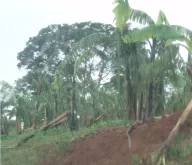In marking World Migratory Bird Day 2011, 14-15 May, Flavia Pansieri, UNV Executive Coordinator, notes the critical role volunteers play participating and engaging others in the environmental movement.
Volunteers have played a critical role since the start of the environmental movement. They have recognized that individual and collective action is necessary to raise awareness about and engage others in environmental action. Everyone shares this responsibility and has a role to play, from turning off the lights in America to planting trees in Ethiopia. Volunteering is centred on values, which makes it very powerful. It is about the genuine desire to make a difference, to get engaged and to respond, says UNV Executive Coordinator Flavia Pansieri. On the ground, that means its about willingly helping people in need, creating positive change in communities, preserving the environment and striving towards the Millennium Development Goals. This weekend, we mark World Migratory Bird Day 2011 under the theme Land-use changes from a birds-eye view. Human use of land has a major impact on natural resources including water, soil, nutrients, plants and animals. Local volunteers have essential knowledge about the biodiversity and challenges of their local environment that puts them in the frontline of protecting the environment. Responding to land degradation, and indeed to the effects of climate change, is high on the agenda of UNV. We work to raise awareness of environmental changes, reduce vulnerability and support response measures. UN Volunteers have been harnessing the skills of people who live under the threat of climate change themselves. For example, UNV works in partnership with the United Nations Development Programme and the Global Environment Facility on the Community-based Adaptation project. This project supports communities in ten countries as they build resilience into their local ecosystems and take ownership of their futures through voluntary action. Assisted by UN Volunteers, community volunteers work on solutions to conserve water, promote sustainable agricultural techniques and protect local biodiversity and ecosystems. This year, we mark the International Year of Youth (IYY), and the tenth anniversary of the International Year of Volunteers (IYV+10). IYY and IYV+10 give us the opportunity to reflect upon the economic and social contributions of youth volunteerism towards progress in advancing the peace and development agenda and achieving the MDGs. In particular, engaging youth as volunteers is a sustainable method in addressing and adjusting to environment challenges, and it is certain to be a defining feature of their future. The involvement of young people in protecting the environment is critical to ensure lasting development for future generations, be it through climate change mitigation and adaptation, the fight against desertification or the management of forests. Some are also making lifestyle decisions in favour of lower consumption and greener practices. Just as migratory birds feel the effects of change before other animals and signal us about the health of our environment, the worlds young advocates have a keen sense of urgency to change the world. Concerned about the planet they will inherit, they are determined to take action. And they are making a noticeable ecological difference, through volunteerism. Voluntary action is essential in our global effort to address climate change, which poses a serious threat to our ability to reach the Millennium Development Goals. [ ] We need people everywhere to volunteer for this challenge, and to help communities mitigate and adapt to the effects of climate change. United Nations Secretary-General Ban Ki-moon For further information, kindly visit www.unv.org or contact information[at]unv[dot]org

